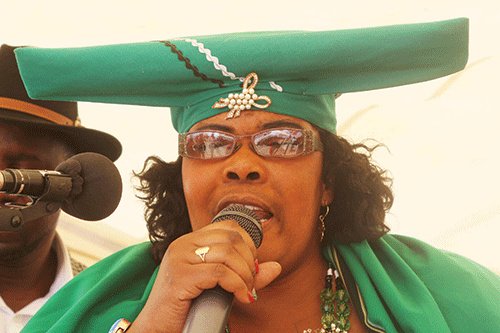The Windhoek High Court has ordered Urban and Rural Development Minister Erastus Uutoni to reconsider the application of late chief Munjuku Nguvauva II’s wife, Aletha Nguvauva, who seeks to be recognised as the Ovambanderu chief.
In a recent judgement delivered by Judge Hannelie Prinsloo, the court set aside Uutoni’s decision to stand by the decision of his predecessors and not consider Nguvauva’s application to be recognised as chief of the Ovambanderu Traditional Community.
She further said Uutoni should have heard Nguvauva and the Ovambanderu Traditional Council before making his decision.
“What is of importance in my view is the fact that in terms of section 5(3), the minister made a recommendation to the president, which is not borne out by the facts as the minister failed to afford the parties a hearing in accordance with the rules of natural justice. The applicants’ application must thus succeed,” said Prinsloo.
The fight over the throne of the Ovambanderu Traditional Authority dates back to 2008 when chief Munjuku Nguvauva II passed on.
Due to conflicts surrounding the succession, the community was divided into two factions. One faction supported Kilus Karaerua Nguvauva, while the other supported Keharanjo II Nguvauva. Kilus and Keharanjo are half-brothers and sons of the late chief Munjuku. The two sons both applied to be recognised by the government for the chieftaincy position.
Thus, the urban and rural development minister appointed an investigating committee to investigate the dispute. The committee recommended that Keharanjo be designated as chief, in accordance with Ovambanderu customs, the son who was born of a chief’s marriage is considered senior for purposes of succession to one born out of wedlock.
The committee also recommended that in the event of uncertainty or disagreement among the members of a traditional community regarding the applicable customary law, the community members may elect, subject to the approval of the minister.
The minister, however, decided that an election be held. Dissatisfied with the minister’s decision for elections, the community approached the High Court. However, while the case was ongoing, Keharanjo passed away.
This resulted in the court ruling in Kilus’ favour and he was confirmed as chief of the Ovambanderu community.
Keharanjo’s mother, Aletha, and his supporters were not happy, and they broke away from the recognised Ovambanderu Traditional Authority and formed their traditional authority, the Ovambanderu Traditional Council.
The Ovambanderu Traditional Council then applied to have Aletha recognised as chief. However, the minister decided not to consider her application.
-mamakali@nepc.com.na


